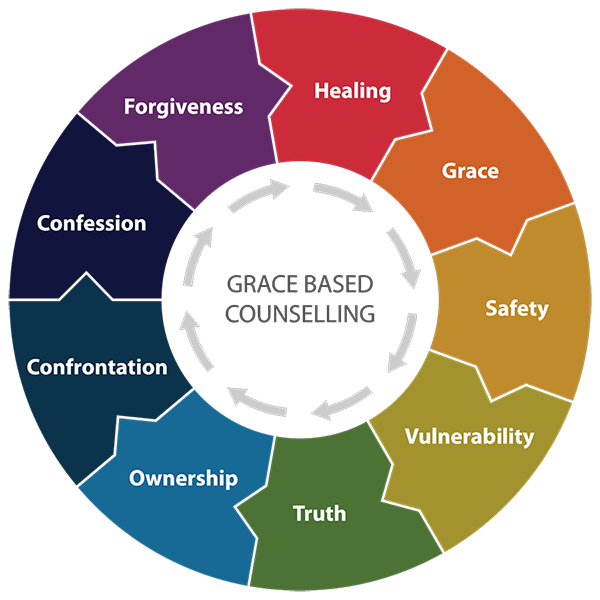Grace Based Counselling
Grace Based Counselling promotes healing and growth by moving through the steps of grace, safety, vulnerability, truth, ownership, forgiveness, and confession. Confession, in turn, leads further away from condemnation, shame, and guilt and creates opportunities to live a grace-filled life.
Grace is the reality that God forgives humans of their sins and offers unmerited kindness and love to those who acknowledge their need for God.
Healing takes courage. Burdens, wounds, and struggles require a safe and confidential environment for these to be treated effectively. Counselling is a safe, protected environment: what is shared in counselling sessions remains private and protected, unless people’s lives are at risk, or justice is obstructed.
Grace and safety contribute to the opportunity to be vulnerable. Sadness, anger, and fear lead us often to believe that we are all alone in our difficulties. Individual and small group counselling helps dispel this notion through the experience of support and affirmation.
When experiences, thoughts and feelings are shared in the context of grace and safety, you will begin to discover truth about yourself and your situation. If you are like most people who come for counselling, you want more than just a place to share your experiences, thoughts, and feelings. Most likely, you also desire accurate and helpful feedback. Grace based counselling operates from the principle that we should speak the truth to one another in love. Truth about yourself can be discovered and, in turn, will set you free from patterns of self-deception, as well as unhealthy patterns of behaviour, thoughts, emotions, or relationships.
Of all the steps and stages, ownership is the one that calls for the most nerve. This is because it is much easier to make excuses or blame others for the existing problems.
Ownership occurs when you take responsibility for your part and acknowledge your contribution to your problem. Grace based counselling will validate, encourage, and support you as you resolve to move towards overcoming any personal or interpersonal problems.
Confession opens the door to bigger and better things: forgiveness and freedom!
Confessing is admitting. It is verbally acknowledging your ownership of the problem.
It is important to admit our shortcomings to others because it makes the guilt, mistakes, and forgiveness real.
Confessing is enormously freeing. It relieves us from the unnecessary burden of the pretence that ‘all is well’ and ‘I am perfect’ when the fact of the matter is that often life is not at all — and everybody is far from perfect.
Few decisions are as difficult and as freeing (!) as the decision to forgive.. Difficult, because to forgive the offender feels so unjust and unfair. Freeing, because the one who resolves to forgive is freed from bitterness, desire for revenge, and anger. Forgiving is an act of the will that requires much time and effort. To be unforgiving is to allow yourself to be on the same painful hook as the offender.
“…When ‘forgiveness’ denies that there is anger, acts as if it never happened, smiles as though it never hurt, fakes as though it’s all forgotten…it’s not forgiveness – only a magical fantasy. When it puts you one-up, on top, in a superior place, as the benefactor, the generous one, the giver of freedom and dignity… it not forgiveness – only sweet revenge…” (Augsburger)







